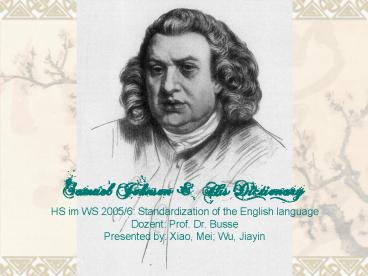Samuel Johnson - PowerPoint PPT Presentation
1 / 13
Title:
Samuel Johnson
Description:
1728 He entered Oxford but was forced to leave after a year for lack of funds. ... its purity may be preserved, its use ascertained, and its duration lengthened. ... – PowerPoint PPT presentation
Number of Views:4912
Avg rating:5.0/5.0
Title: Samuel Johnson
1
- Samuel Johnson His Dictionary
- HS im WS 2005/6 Standardization of the English
language - Dozent Prof. Dr. Busse
- Presented by Xiao, Mei Wu, Jiayin
2
Lifeline
- Samuel Johnson, Writer
- Born 18 September 1709
- Birthplace Lichfield, England
- Died 13 December 1784
- Best Known As Editor of A Dictionary of the
English Language (1755)
3
Early Life and Works
- 1728 He entered Oxford but was forced to leave
after a year for lack of funds. - 1729-1735 He sustained himself as a bookseller
and schoolmaster. - 1735 He married Elizabeth Porter, a widow 20
years his senior, and remained devoted to her
until her death in 1752. - 1737 Johnson settled in London and began his
literary career in earnest. Edward
Cave's Gentleman's Magazinepoetry and prose on
subjects literary and political. - 1738 Poem London published anonymously, praised
by Pope won Johnson recognition in literary
circles. - 1744 Life of Savage, a bitter portrait of
corruption in London and the miseries endured by
writers. - 1749 The Vanity of Human Wishes.
- 1750-1752 The Rambler, essays.
4
Later Life and Works
- 1755 Dictionary of the English Language, the
first comprehensive lexicographical work on
English ever undertaken. - 1759 Rasselas, a moral romance.
- 1761 The Idler, a collection of his essays.
- 1764 Johnson and Joshua Reynolds founded The
Club (later known as The Literary Club). - 1765 Johnson's long-heralded edition of
Shakespeare appeared. - 1770s Johnson wrote a series of Tory pamphlets.
- 1773 He toured the Hebrides with Boswell and
published his account of the tour in 1775. - 1779-1781 Lives of the Poets, his last major
work.
5
A Dictionary of the English Language
- Published in London
- Printed by W. Strahan in 1755
- Written in 1747-1755
- 42,773 words
- 114,000 quotations
6
The Plan of A Dictionary of the English Language
(1747)
- Johnson aims to compile a dictionary by which
the pronunciation of our language may be fixed,
and its attainment facilitated by which its
purity may be preserved, its use ascertained, and
its duration lengthened. - - Two major decisions discussed by Johnson The
delimitation of the dictionary what to put in
and what to leave out that of the authority and
the basis on which his decisions are made.
7
The Features of the Dictionary
- Numbered senses
- i. natural and primitive signification
- ii. consequential meaning
- iii. metaphorical sense
- iv. Any observation that arises from the
comparison of one meaning with another
8
The Features of the Dictionary
- Illustrative quotations
- 114,000 quotations from books to illustrate the
meanings of words - The first lexicographer to introduce quotations
from modern authors Shakespeare, Milton and
Dryden into an English dictionary, and Johnson
was making these authors into modern classics. - Citations in Latin and Greek languages
9
The Features of the Dictionary
- Domains
- Johnson is the first to recognize that language
is made up of multiple areas of discourse, or
domains, each with its own specialized
vocabulary, and each with its own specialized
meanings for words, even if these words were
common words of the language.
10
Johnson's version
- Most frequently, Johnson quoted Shakespeare,
Milton and Dryden. However, if he didn't like a
quotation, or if a phrase didn't convey the exact
meaning he required, he did not hesitate to chop,
twist around, or rewrite a few words. - Johnson also recognized, however, that language
is difficult to fix. - Unlike most modern lexicographers, Johnson
introduced humor or prejudice into many of his
definitions.
11
Criticism
- Johnson limited his explorations, searching only
through the books on his own shelves, or those
lent to him by friends and acquaintances. - Johnson was criticized for imposing his
personality on to the book. - Johnson's etymology would be considered poor by
modern standards, and he gave little guide to
pronunciation.
12
Literature
- Tony Crowley, Proper English? readings in
language, history and cultural identity. - Samuel Johnson, A Dictionary of the English
Language, CDROM. - http//www.fab24.net/jd100203/index_.htm
13
-The End-
















![[PDF] DOWNLOAD Danubia: A Personal History of Habsburg Europe PowerPoint PPT Presentation](https://s3.amazonaws.com/images.powershow.com/10121826.th0.jpg?_=202409060310)



![[PDF] DOWNLOAD The Tragedy of Liberation: A History of the C PowerPoint PPT Presentation](https://s3.amazonaws.com/images.powershow.com/10112817.th0.jpg?_=202408300711)










